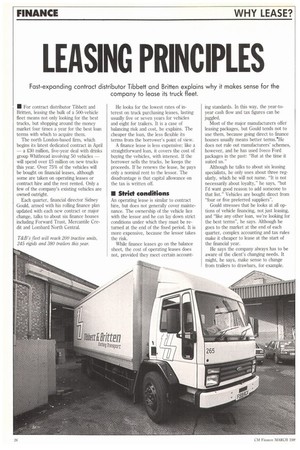LEASING PRINCIPLES
Page 138

If you've noticed an error in this article please click here to report it so we can fix it.
• For contract distributor Tibbett and Britten, leasing the bulk of a 500-vehicle fleet means not only looking for the best trucks, but shopping around the money market four times a year for the best loan terms with which to acquire them The north London-based firm, which begins its latest dedicated contract in April — a £30 million, five-year deal with drinks group Whitbread involving 50 vehicles — will spend over £5 million on new trucks this year. Over 75% of the vehicles will be bought on financial leases, although some are taken on operating leases or contract hire and the rest rented. Only a few of the company's existing vehicles are owned outright.
Each quarter, financial director Sidney Gould, armed with his rolling finance plan updated with each new contract or major change, talks to about six finance houses including Forward Trust, Mercantile Credit and Lombard North Central. He looks for the lowest rates of interest on truck purchasing leases, lasting usually five or seven years for vehicles and eight for trailers. It is a case of balancing risk and cost, he explains. The cheaper the loan, the less flexible its terms from the borrower's point of view.
A finance lease is less expensive; like a straightforward loan, it covers the cost of buying the vehicles, with interest. If the borrower sells the trucks, he keeps the proceeds. If he renews the lease, he pays only a nominal rent to the lessor. The disadvantage is that capital allowance on the tax is written off.
• Strict conditions
An operating lease is similar to contract hire, but does not generally cover maintenance. The ownership of the vehicle lies with the lessor and he can lay down strict conditions under which they must be returned at the end of the fixed period. It is more expensive, because the lessor takes the risk.
While finance leases go on the balance sheet, the cost of operating leases does not, provided they meet certain account
ing standards. In this way, the year-toyear cash flow and tax figures can be juggled.
Most of the major manufacturers offer leasing packages, but Gould tends not to use them, because going direct to finance houses usually means better terms.'He does not rule out manufacturers' schemes, however, and he has used Iveco Ford packages in the past: "But at the time it suited us."
Although he talks to about six leasing specialists, he only uses about three regularly, which he will not name. "It is not necessarily about loyalty," he says, "but I'd want good reason to add someone to that list." Vehicles are bought direct from "four or five preferred suppliers".
Gould stresses that he looks at all options of vehicle financing, not just leasing, and "like any other loan, we're looking for the best terms", he says. Although he goes to the market at the end of each quarter, complex accounting and tax rules make it cheaper to lease at the start of the financial year.
He says the company always has to be aware of the client's changing needs. It might, he says, make sense to change from trailers to drawbars, for example.




















































































































































